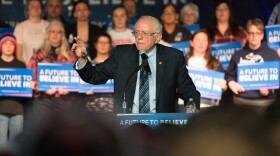As the Democratic presidential contest intensifies and Super Tuesday looms, campaigns are seeking the support of particular communities or demographics. In Michigan, and the nation as a whole, many Arab Americans are aligning themselves with Vermont Senator Bernie Sanders.
“I’ve been covering this since 2016, and if you want to dissect the phenomenon of Arab Americans for Bernie, I think we should start with the fact that many young people are backing Bernie Sanders,” says Middle East Eye reporter Ali Harb. “Arab Americans are a young population in this country, so you see a draw towards his campaign from young Arab Americans who are more politically involved than the older Arab-American generation.”
Harb suggests that many Arab Americans respond well to Sanders’ policy goals. He says that though not all Arab Americans prefer Sanders as a Democratic nominee, and some support President Donald Trump, Sanders’ success within the Michigan Arab-American community partially stems from his 2016 campaign efforts in the state.
“He did two rallies in Dearborn, Michigan. He met with Arab-American activists and advocates days before the primaries. He ran ads in Arabic,” Harb says. “That’s something that the Bernie Sanders campaign is doing: it’s meeting people where they are--it’s speaking people’s literal and political language.”
Amer Zahr, a comedian, writer, professor and national surrogate for Bernie Sanders 2020, affirms the importance of the Sanders campaign’s on-the-ground efforts in Arab-American communities in securing the Vermont senator a Michigan win in 2016.
“In 2016, Dearborn overwhelmingly went for Bernie Sanders, especially the Arab-heavy precincts of east Dearborn,” Zahr said. “That campaign brought people into our community. They brought field directors, political directors in, [found] organizers. I was one of those people--I eventually became a surrogate for the campaign. So, they spoke to us, okay? That’s the first step of touching any marginalized community, especially a community like ours, which has been seen sort of traditionally as toxic to any political campaign. Now we are being seen as an asset.”
Zahr cautions against treating the Arab-American community as a monolith or mistaking it for the Muslim-American community.
“The Arab-American community is very diverse. We should be careful not to conflate the terms ‘Arab’ and ‘Muslim,’” he says. “Half of the Arab-American community in America is Christian. And remember, most Muslims in America are not Arab.”
Zahr recently penned an essay in the Israeli newspaper Haaretz in which he writes about reasons many voters in the Arab-American community are drawn to Sanders, and why that surprises some outsiders. He says he’s been asked by journalists why the Arab-American community could be so supportive of a Jewish candidate.
“There’s so much racism in that one question,” Zahr says. “We don’t look at Bernie Sanders’ Jewishness and say to ourselves, ‘Oh, we have to get over that before we support him.’ In fact, it's quite the opposite. We look at Bernie Sanders’ Jewishness as sort of an asset, sort of something that connects us to him more.”
“He talks about fighting for the weakest among us, and he talks about standing up for somebody you don't know and saying we’re all in this together,” Zahr says. “That’s stuff that me and Ali and every Arab American have been hearing from their parents forever. It’s nothing new.”
Harb says he thinks, aside from Michigan, Virginia and California are states where Arab-American voters could play a pivotal role in selecting a winner in the upcoming primaries.
“Arab Americans are also very heavily involved in politics in Texas and California, and those are the two most delegate-rich states on Super Tuesday,” Zahr adds. “So in elections that we expect might be close, we have a big hand in pushing Bernie Sanders, or any other candidate, over the edge.”






